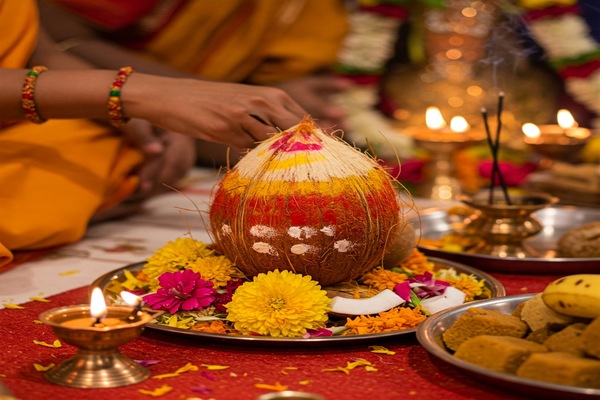
What Is The Significance Of Coconut In Hindu Rituals?
In the spiritual path of Hinduism, every ritual has a purpose and every symbol carries a deep spiritual meaning which guides our soul toward a divine awakening. Coconut is one such thing that is seen as a sacred offering in Hindu rituals and represents purity, devotion, and divine grace. When we offer coconut in prayers, it bridges a sacred connection between the divine and the devotee. It is believed that coconut absorbs negative energy and brings blessings to those who offer it with devotion.
Legend Behind The Coconut
According to Hindu belief, when Lord Vishnu descended on Earth, he brought three divine blessings: Goddess Lakshmi, the Kamdhenu cow, and the coconut tree. It is believed that the coconut carries the divine energy of Lord Vishnu and Mata Lakshmi, which brings good fortune. The coconut is often referred to as Shriphal (divine fruit), which signifies the presence of the Trinity, Brahma, Vishnu, and Mahesh.
Another legend says that Sage Vishwamitra once wanted to build a heavenly paradise on Earth. So, while creating this divine place, he created the coconut. From there it became a sacred fruit carrying spiritual meaning and a symbol of purity while taking its place in the sacred rituals of Hinduism.
Symbolic Meaning of The Coconut in Hinduism
The coconut is not just a fruit in Hinduism, it is full of deep symbolism and spiritual significance. The hard outer shell represents the human ego and worldly attachments. When a coconut is broken in a ritual, it means the person is ready to let go of their ego and attachments. This is a simple act of devotion, which shows a devotee’s willingness to surrender to the divine power and focus on inner purity.
Its three marks are believed to symbolize Lord Shiva’s three eyes. So, as a general belief, people offer the coconut to Lord Shiva to seek his guidance. Many believe that breaking a coconut during prayers can remove financial obstacles and bring good fortune. This fruit holds great spiritual meaning and is a symbol of faith, hope, and prosperity.
Significance of Breaking A Coconut In Hindu Rituals
Hindus believe that coconut brings luck because of its purity. They offer it in pujas to seek the blessings of the divine. There is a tradition of breaking a coconut for good luck before starting new journeys like weddings or housewarmings. This fruit holds a special place in Hinduism as it represents all five elements - earth, water, air, fire, and ether. So, offering the coconut not only has a traditional significance but also it is a way to stay connected to nature and the divine energy.
Breaking a coconut is not only a tradition, it has a deeper meaning. Different parts of the coconut hold special significance. The hard shell symbolizes one’s ego, the softer inner part represents kindness, and the water inside is known for its purity. So, when people break a coconut, it means they break their ego, learn to be humble and kind, and purify their soul.
The Coconut: A Symbol of Goodness
Why does the coconut hold a special place in Hindu religion? Beyond being a tasty fruit, it’s a powerful symbol of good luck, peace, and prosperity. Hindu rituals are incomplete without offering the coconut in religious ceremonies to seek blessings from the divine. But apart from religious connection, the coconut has immense health benefits as it is packed with nutrients which supports our physical well-being. This is a symbol of both spiritual and physical health. In Hinduism, it is an offering that connects nature with the divine. The simple presence of coconut represents a union of mind, body, and spirit, that makes it an integral part of daily rituals and celebrations.





